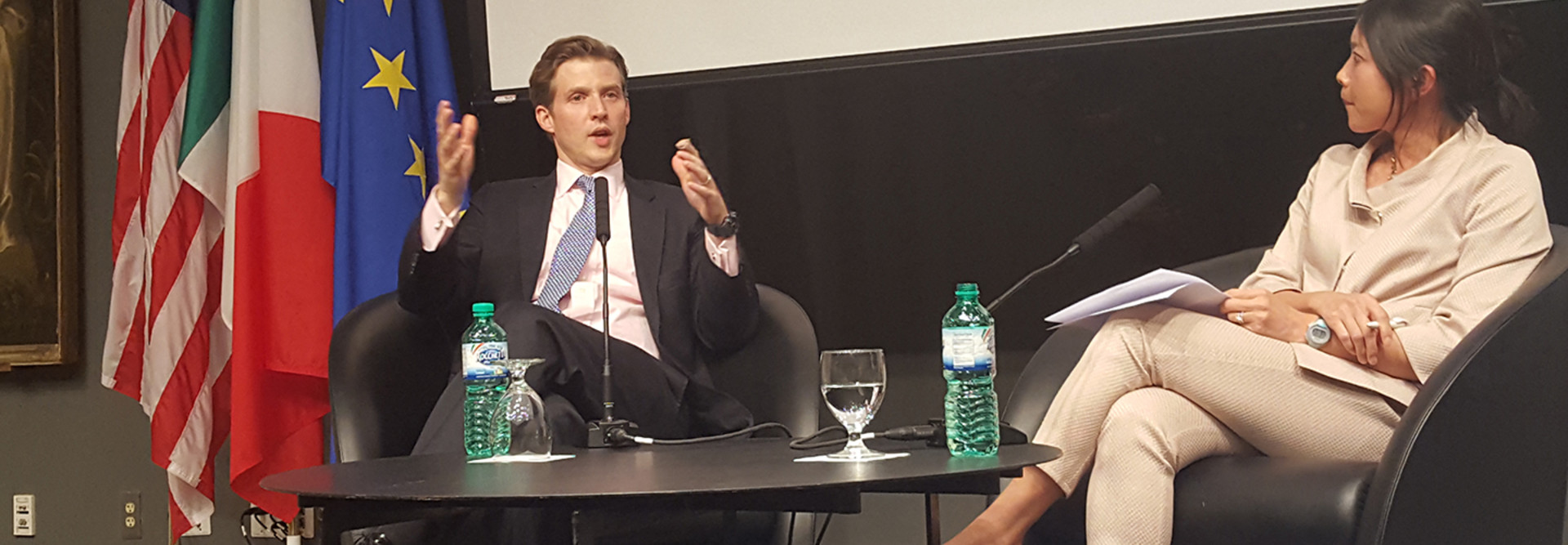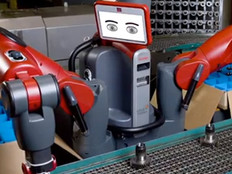Artificial Intelligence, Genomics and Robotics Will Be Among Industries of the Future
Which industries will come to the fore in the next decade, and beyond, and become hubs of innovation? According to former State Department official Alec Ross, they won’t be the industries that have dominated technology thus far. Instead, artificial intelligence (AI), genomics and robotics will lead the way.
On Tuesday, the Italian Embassy in Washington, D.C., held an event to discuss Ross’ recently published book, The Industries of the Future. He expounded on the book’s themes and highlighted what it will take for individuals, companies and countries to harness the changes that he sees coming to the global economy.
In his book, Ross argues that robotics, cybersecurity, the commercialization of genomics, the evolution of Big Data and the digitization of money and markets will be the most significant during the next decade. The book explores the effects those industries will have on how people work and how the economy will change as a result.
Ross, who served as former Secretary of State Hillary Clinton’s senior adviser for innovation from 2009 to 2013, said new industries will take the place of those that currently rule the economic landscape. “The world’s last trillion-dollar industry was created out of computer code,” he said. “The world’s next trillion-dollar industry will be created from genetic code.”
The Future Is Coming
The last decade has been hugely influenced by information and communications technology (ICT), which has helped transform networks and spurred the development of mobile technologies such as smartphones and networks. Ross said that China “has not innovated much of anything in the digital space” and that the country’s leading ICT companies stole the intellectual property of Western firms in an effort to establish power in China, a market with 1.3 billion people. But Ross is optimistic that China will be able to innovate on its own in the next decade.
The commercialization of genomics is going to be a key new industry, according to Ross. He noted that China-based BGI, formerly the Beijing Genomics Institute, is one of the world’s leading genomics companies and has partnered with U.S. nonprofit Autism Speaks.
AI and robotics will also become much more important factors in the economy in the years to come, Ross said, adding that he considers the leading countries in robotics to be the U.S., Germany, Japan, South Korea and China.
“China is taking a much more progressive, open, honest and ultimately wealth-creating approach to those industries,” he said.
The industrial economy of the last century allowed workers to thrive by letting them do work that was manual and routine, but such workers have increasingly been displaced by cheaper labor. However, the industries of the future will displace more-skilled workers, Ross indicated.
He said AI and developments in robotics “will enable work to be done by machines that are not merely manual and routine, but increasingly cognitive and non-routine.”
Ross worries that wage stagnation will continue in the U.S. as the next wave of automation replaces more human workers. He said that “we need to focus on our education system” to ensure that students are learning the skills that are needed in the new economy.
Openness Will Allow New Industries to Thrive
Ross suggested that people now in the midst of their careers must be “lifelong learners” who are constantly acquiring new skills and knowledge in order to thrive in the years to come. In schools, Ross said, the U.S. needs to “reimagine how we do vocational training” and bring science, technology, engineering and math to a wider range of classrooms and communities.
At the country level, Ross said, the key divide of the 21st century will be between open and closed societies, instead of the fights between the political right and left that dominated the 20th century. Ross described an open society as one in which upward economic mobility is available to people throughout the society, not just to elites, and in which the rights of women and ethnic and sexual minorities are fiercely respected.
“The states in society that are most open will become the home to the industries of the future,” he said. The ones “that really comport to the values of this innovator class are where they are going to congregate.”
Particularly for entrepreneurs in their 20s and 30s, Ross said, the next global centers of innovation like Silicon Valley “will largely map to those places that are very open.”
Ross is particularly optimistic about the future economic prospects of Scandinavia and the Baltics; sub-Saharan Africa; and South American countries such as Argentina, Chile and Colombia. Ross also thinks Australia, New Zealand, South Korea and Singapore will thrive, and that, thanks to robotics, Japan will as well. In the U.S., some people will thrive and some won’t, Ross said, adding that U.S. policies need to address how to help the most vulnerable citizens. Ross is not optimistic about Russia, former Soviet republics and the Middle East.
Ross added that he takes a moderate view of the future, seeing it as neither utopian nor dystopian. “I don’t think of ‘disruptive’ as being implicitly pejorative,” he said.









